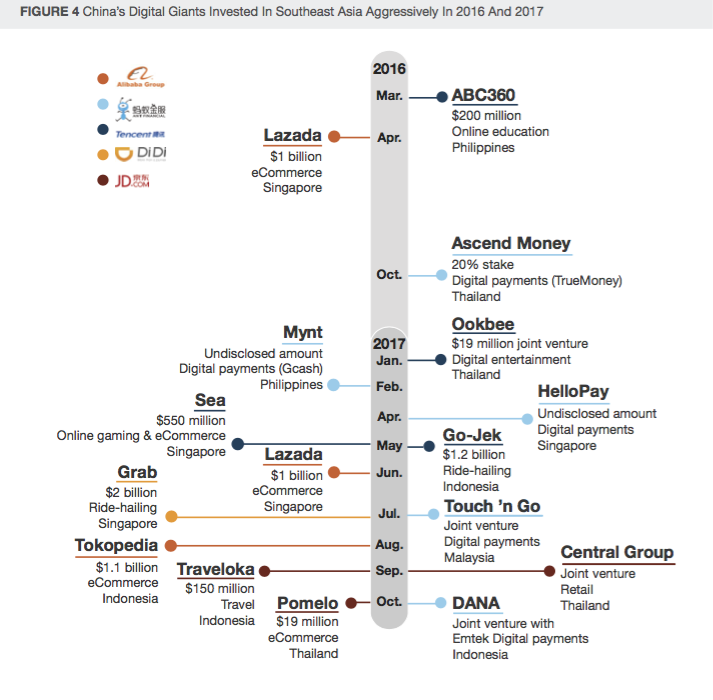Weekly Focus: Marketers Have More Options as Growing E-Commerce Expands SEA Digital Ecosystem

This week, the spotlight is on marketers and the need for them to work within Southeast Asia's expanding digital ecosystem, the growth of which is fuelled by Chinese investors and increasing use of e-commerce platforms and mobile payments.
China's tech giants in the past couple of years have been pumping big dollars into Southeast Asia. Specifically, Alibaba and its subsidiary Ant Financial, as well as Tencent, Didi, and JD.com last year invested more than USD$6bn (£4.33bn) in the region on mergers and acquisitions.
In comparison, U.S. players have invested less than USD$1bn (£721.79m), according to Forrester's senior analyst for B2C marketing, Wang Xiaofeng. She noted that the Chinese tech companies have been investing primarily in e-commerce, mobile payments, and logistics.
Wang said: "Emerging digital platforms like Grab, Go-Jek, and Lazada are particularly relevant because their scale and the data they have mean that they own Southeast Asian consumers' major mobile moments, such as travelling, shopping, and paying. These are the most valuable moments for marketers who want to understand and engage with consumers."
Alibaba, for example, invested in Lazada and Indonesia's Tokopediam, while its Chinese rival JD.com focused its investment on Indonesian online travel agency Traveloka, online fashion retailer Pomelo, and set up a joint venture with Thailand's retail giant Central Group.
However, when Amazon entered the Singapore market last year with Prime Now and Prime, its focus on Southeast Asia was comparatively conservative.
Alibaba's mobile payments platform Alipay also roped in local merchants and partners on campaigns and promotions, while Apple did not engage its partners on the same level of marketing when it launched Apple Pay in Singapore in April 2016, Wang noted.
She said these Chinese market players' aggressive expansion into the region had created a new digital ecosystem that offered marketers additional options.

(Source: Forrester)
"As consumers increasingly use digital platforms backed by Chinese digital firms for online shopping, mobile payments, and offline services, B2C marketing professionals in the region should adapt to the changing conditions and learn how to work within the new digital ecosystem", the Forrester analyst said.
According to Wang, marketers would have more choices on where to spend their digital advertising dollars. While Google and Facebook currently account for the bulk of the region's digital ad revenue, with e-commerce and mobile apps increasingly essential to consumers' daily lives, marketers in Southeast Asia would begin moving more ad dollars to new digital platforms, she said.
She pointed to brands that had worked with Indonesia's Go-Jek to reach out to consumers, as well as mobile phone maker Oppo, which had revealed plans to shift its ad dollars to online retail sites.
Oppo's overseas digital marketing lead Gary Fang said in the Forrester report: "Currently in Southeast Asia, we allocate more than half of our digital advertising budget to the Google and Facebook platforms. In the future, we'll shift it to e-commerce platforms to drive sales.
"In particular, we will focus on Lazada [which] shows great interest in working with marketers like us and proactively reaches out for collaboration opportunities, whereas Amazon takes its time and doesn't show the same level of ambition in the market", Fang revealed.
Wang also urged marketers to work with these tech companies to yield deeper insights from their data, especially since vendors such as Alibaba and Tencent operated multiple businesses including e-commerce, social media, payments, and video.
This meant they had wide-reaching presence in the ad-tech and martech value chain, running their own demand-side platforms, data management platforms, and marketing cloud services, she said.
Alibaba Offers 24/7 Delivery Service
Alibaba also announced that its 25 Hema supermarkets in Beijing and Shanghai will offer round-the-clock delivery service.
Customers living within a three-kilometre radius of a Hema store will be able to receive goods within 30 minutes after placing their orders on Alibaba's mobile app. The new service encompasses most items held in the store, excluding some fresh produce. Cooked meals also will be available for delivery until 1am.
Hema CEO Hou Yi said: "We found that [Alibaba's] new retail [strategy] doesn't only merge online with offline, but also connects day and night."
According to Alibaba, more than 80 million users of its Taobao and Tmall marketplaces visited the online retail sites between midnight and 4am. Most of these were women aged above 30, said the e-commerce operator.This content was originally published in RetailTechNews.








Follow ExchangeWire